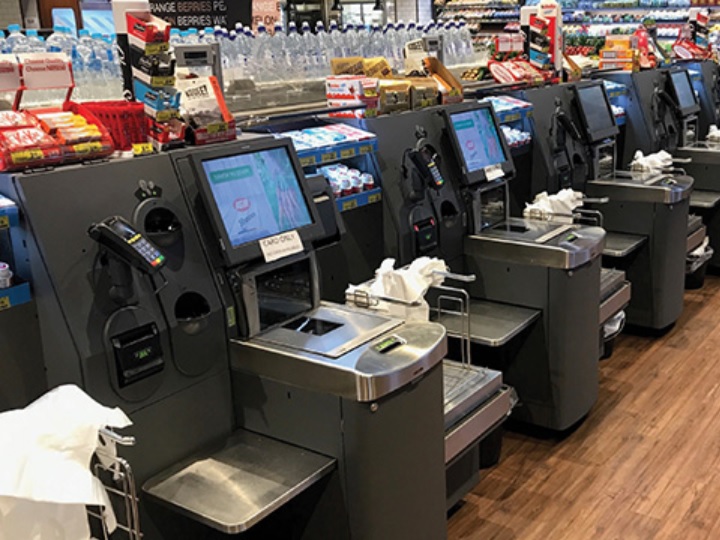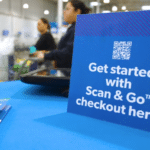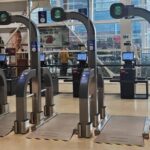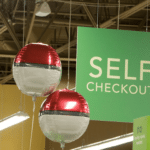
“Smile, you’re on camera!” You’ve probably been to self-checkouts where you see yourself on a monitor, as a reminder that there are security cameras watching you check out. But those cameras could be doing more than just watching you. They could be able to alert store staff if you’re up to no good – or even if you just look like you might be.
Self-checkout maker Toshiba Global Commerce Solutions has filed a patent application for a system that would scrutinize your facial expressions to determine if you’re stealing, planning to steal, or even just thinking about stealing.
The newly-published patent documentation describes a self-checkout equipped with a camera that will look for customers’ “microexpressions,” or barely-perceptible “tells” that let on what the customers are thinking. Microexpressions are “minute or small involuntary or voluntary physical change or changes to a person’s face that can be indicative of a mood, feeling, or intention of the individual,” the application explains. “Because they indicate a suppressed emotion, a microexpression may be used to determine an ulterior motive such as honesty, dishonesty, or an intention to not adequately pay for items.”
“Not adequately pay for items” – otherwise known as “stealing stuff.”
Toshiba, and the retailers that use its checkout machines, are constantly looking for ways to combat theft. Gone are the days when the machines would simply bark at you any time you did something wrong – “Unexpected item in the bagging area!” “Please wait for assistance!” Instead, many newer systems have cameras that quietly watch as you scan your items, making sure that what you scan matches what you put in your bag.
But Toshiba’s new invention will do more than just watch your transaction. It will be watching you. Its cameras will continuously scan live images of shoppers’ expressions to run them against a database full of suspicious-looking faces. If a customer’s microexpression “matches a predetermined expression, such as a guilty expression, a scared expression, or a confused expression,” the system will flag the customer for special attention, notifying store staff that they’d better keep an eye on a potential crime in progress.
The system would account for honest mistakes, lowering the alert level “if corrective actions are taken, such as removing an incorrect item and replacing it with the correct item.” But if suspicious microexpressions are accompanied by multiple suspicious actions, the entire transaction can be automatically halted until an attendant can come by and take over.
Shoppers may find it a little creepy to be monitored to this extent – you may be doing nothing wrong and have nothing to hide, but do you really want a camera scrutinizing your every expression in an attempt to read your mind? But retail theft, particularly at self-checkouts, is a serious problem that this invention aims to solve.
A recent report from the National Retail Federation found that American retailers lost $61.7 billion to theft last year, up more than 20% from $50.6 billion the year before. Much of that theft occurs at self-checkout registers, where some shoppers “forget” to scan some of their items, “accidentally” scan inexpensive items while bagging more expensive ones, or “innocently” scan the same coupon thousands of times in order to get everything for free.
At one time, many retailers were reluctant to install self-checkout registers at all. But many have finally given in, deciding that the convenience outweighs the cost of potential losses. Judging by Toshiba’s idea, though, they’re still looking for ways to prevent those losses.
And if the idea offers some side benefits, even better. Toshiba says its cameras could also be used to monitor cashiers – not for theft, but for performance. “For example, if the cashier is showing microexpressions indicating fatigue, management can be alerted to give the cashier a break,” the patent documentation explains. “If the cashier is showing microexpressions indicating anger or frustration, management can be alerted to intervene to alleviate the situation, such as a confrontation with a customer.”
And the system could even be leveraged to make a little money from advertisers on the side. Instead of a monitor that shows your own image, the camera could be hidden behind a monitor that shows you commercials. “An image capture device directed to the customer’s face may capture the customer’s microexpressions in response to the displayed advertisements,” the patent application reads. “By analyzing the customer’s direction of eyes to the screen and microexpressions, advertisements can be analyzed or ranked for effectiveness.”
Ok, so that level of monitoring may be crossing the line from clever to creepy. But these days, with cameras and security monitors everywhere, you already know you’re being watched when you shop. If Toshiba’s invention comes to a store near you – you may just have to get used to being watched a little more closely than ever.
Image source: Toshiba










